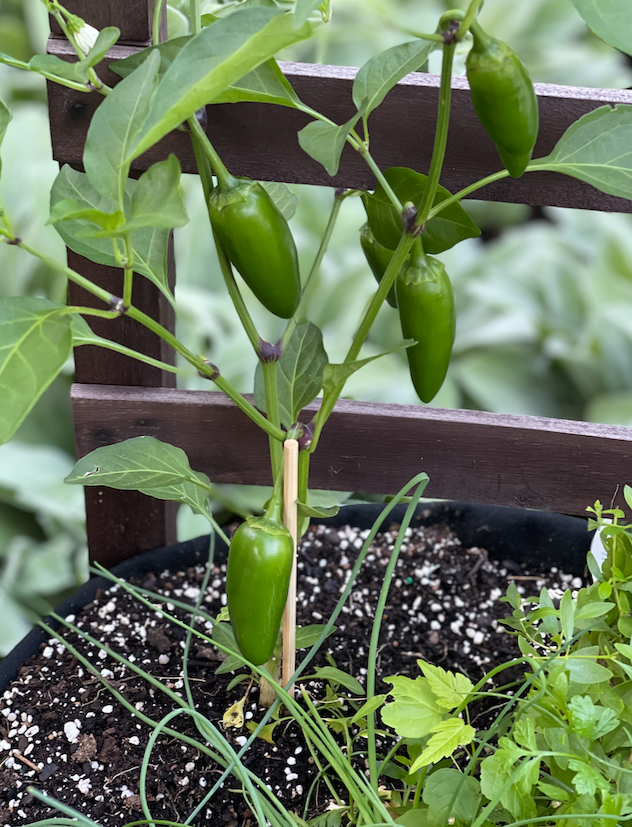Check Out the Best Fertilizers for Peppers and Enhance Your Yard's Return
Check Out the Best Fertilizers for Peppers and Enhance Your Yard's Return
Blog Article
Organic Vs. Synthetic Fertilizers: Which Is Best for Nurturing Healthy And Balanced Pepper Plants?
In the world of nurturing healthy pepper plants, the selection in between natural and synthetic plant foods stands as an essential choice with significant implications. While both alternatives purpose to give crucial nutrients to sustain plant growth, the nuances of their effect on the dirt, plant wellness, and the atmosphere stimulate a dispute that echoes throughout the horticulture area. Recognizing the distinctive benefits and prospective risks of each fertilizer type is crucial for pepper growers looking for to maximize their yields while keeping an eco-conscious and lasting method.
Benefits of Organic Plant Foods
Organic plant foods offer an environmentally-friendly and sustainable approach to beneficial pepper plants, providing important nutrients without making use of artificial chemicals. These natural fertilizers are stemmed from natural sources such as compost, manure, bone dish, and seaweed, promoting dirt health and wellness and biodiversity. Unlike synthetic plant foods, organic alternatives release nutrients slowly, ensuring a balanced and consistent supply for pepper plants to thrive.
One considerable advantage of organic plant foods is their capacity to improve soil framework and water retention. By enhancing soil wellness, organic fertilizers advertise useful microbial task, which helps in nutrient uptake by pepper plants. In addition, organic plant foods decrease the threat of chemical run-off, safeguarding water sources from contamination and protecting the setting.
Moreover, organic plant foods add to lasting soil fertility by advertising the growth of beneficial soil microorganisms. These organisms aid break down raw material, releasing nutrients in a type that is quickly obtainable to pepper plants. best fertilizers for peppers. By fostering a healthy dirt ecosystem, organic fertilizers sustain lasting pepper farming techniques that profit both plants and the setting
Downsides of Artificial Plant Foods
Artificial plant foods, in comparison to their natural equivalents, present different downsides when utilized to nourish pepper plants, affecting both plant health and wellness and environmental sustainability. One major drawback of synthetic plant foods is their propensity to seep nutrients from the soil rapidly. This fast leaching can result in nutrient imbalances in the soil, creating plants to suffer from deficiencies or toxicities. In addition, artificial plant foods can harm useful dirt microorganisms, such as earthworms and valuable microorganisms, interrupting the soil community's balance.
Additionally, the overuse of artificial fertilizers can add to water air pollution. Excess plant foods not soaked up by plants can remove right into water bodies, resulting in eutrophication, where algae flowers deplete oxygen degrees in the water, hurting marine life. Moreover, synthetic fertilizers are commonly stemmed from non-renewable sources, such as fossil gas, contributing to carbon emissions and ecological deterioration during their production.
Nutrient Absorption Contrast
When contrasting artificial and organic fertilizers in terms of nutrient absorption, natural fertilizers have the advantage of giving a more balanced and slow-release resource of nutrients. Organic fertilizers consist of a range of macro and micronutrients that are not only valuable for the plants however additionally promote healthy and balanced dirt microbial task, which aids in nutrient uptake.
Furthermore, organic plant foods enhance soil framework and water retention capacity, allowing pepper plants to gain access to nutrients more efficiently. This enhanced dirt quality helps with root advancement, allowing much better nutrient absorption. Synthetic fertilizers, although initially enhancing plant development because of their high nutrient focus, may hinder lasting nutrient absorption by derogatory dirt health and wellness in time.
Environmental Influence Factors To Consider

On the various other hand, synthetic plant foods, although commonly more instantly available and focused to plants, can have detrimental results on the atmosphere if not used correctly (best fertilizers for peppers). Their manufacturing needs high energy inputs, causing greenhouse gas emissions and adding to climate adjustment. Furthermore, the drainage of excess synthetic plant foods can pollute water resources, resulting in eutrophication and damaging aquatic ecological communities.
Ideal Fertilizer Practices for Peppers
When feeding pepper plants, browse this site maximizing nutrient uptake and reducing ecological influence are key considerations. To attain this, it is important to comply with finest plant food techniques tailored to the certain needs of pepper plants. One essential method is to execute a soil examination before applying any fertilizers. This test can determine the pH level of the dirt and recognize any kind of nutrient shortages, leading you in picking one of the most appropriate plant food formula.
One more essential practice is to feed pepper plants at the appropriate time. Typically, peppers gain from obtaining plant food at growing and then again when they start to blossom. Over-fertilizing can result in nutrition imbalances and harm the plants, so it is essential to adhere to suggested application rates.
Additionally, choosing a well balanced plant food with an NPK ratio that suits pepper plants' requirements is basic. Organic fertilizers, such as garden compost or manure, can be superb options as they release nutrients gradually and enhance soil framework in time. Artificial plant foods can give a quick nutrient increase when needed. Inevitably, incorporating natural and synthetic fertilizers judiciously can aid support healthy pepper plants while reducing ecological influence.
Verdict

Organic plant foods offer a sustainable and environmentally-friendly strategy to nourishing pepper plants, offering necessary nutrients without the use Related Site of synthetic chemicals. Unlike synthetic fertilizers, natural options release nutrients slowly, making certain a well balanced and stable supply for pepper plants to prosper.
Artificial fertilizers, in contrast to their organic equivalents, posture various drawbacks when utilized to nurture pepper plants, influencing both plant health and environmental sustainability. When comparing natural and artificial plant foods in terms of nutrient absorption, organic fertilizers have the advantage of supplying a more balanced and slow-release source of nutrients.Moreover, natural plant foods enhance soil structure and water retention ability, permitting pepper plants to accessibility nutrients extra successfully.
Report this page